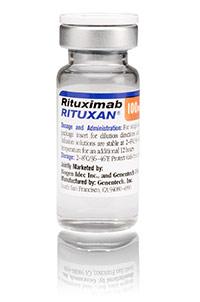Rituxan Disease Interactions
There are 7 disease interactions with Rituxan (rituximab).
- Autoimmune diseases
- Cardiac dysfunction
- Hepatitis B
- TLS
- Bone marrow suppression
- Infections
- Renal impairment
Rituximab (applies to Rituxan) autoimmune diseases
Major Potential Hazard, Moderate plausibility. Applicable conditions: Autoimmune Disorder, Lymphoma, Myeloproliferative Disorder
JC virus infection resulting in Progressive Multifocal Leukoencephalopathy (PML) and death can occur in rituximab-treated patients with hematologic malignancies or with autoimmune diseases. Consider the diagnosis of PML in any patient presenting with new-onset neurologic manifestations. Discontinue rituximab and consider discontinuation or reduction of any concomitant chemotherapy or immunosuppressive therapy in patients who develop PML.
References
- "Product Information. Rituxan (rituximab)." Genentech PROD (2001):
Rituximab (applies to Rituxan) cardiac dysfunction
Major Potential Hazard, High plausibility. Applicable conditions: Arrhythmias, Ischemic Heart Disease
Cardiotoxicity has been reported in a few patients receiving rituximab infusion during clinical studies. Patients with a history of angina or arrhythmias have experienced recurrences of these conditions during administration of rituximab. Therapy with rituximab should be administered cautiously in patients with preexisting arrhythmias or coronary artery or ischemic heart disease. Clinical monitoring of cardiac function throughout infusion and immediately post-infusion is recommended.
References
- "Product Information. Rituxan (rituximab)." Genentech PROD (2001):
Rituximab (applies to Rituxan) hepatitis B
Major Potential Hazard, Moderate plausibility. Applicable conditions: Infectious Hepatitis
Rituximab, as other drugs classified as CD20-directed cytolytic antibodies can cause hepatitis B virus (HBV) reactivation, in some cases resulting in fulminant hepatitis, hepatic failure and death. Cases have been reported in patients who are hepatitis B surface antigen (HBsAg) positive and in patients who are HBsAg negative but are hepatitis B core antibody (anti-HBc) positive. Reactivation also has occurred in patients who appear to have resolved hepatitis B infection (i.e., HBsAg negative, anti-HBc positive and hepatitis B surface antibody [anti-HBs] positive). Screen all patients for HBV infection by measuring HBsAg and anti-HBc before initiating treatment with rituximab. Monitor patients with evidence of current or prior HBV infection for clinical and laboratory signs of hepatitis or HBV reactivation during and for several months following rituximab therapy. In patients who develop reactivation of HBV while on rituximab, immediately discontinue rituximab and any concomitant chemotherapy, and institute appropriate treatment.
References
- "Product Information. Rituxan (rituximab)." Genentech PROD (2001):
Rituximab (applies to Rituxan) TLS
Major Potential Hazard, Moderate plausibility. Applicable conditions: Tumor Lysis Syndrome
Acute renal failure, hyperkalemia, hypocalcemia, hyperuricemia, or hyperphosphatemia from tumor lysis, some fatal, can occur within 12-24 hours after the first infusion of rituximab in patients with Non-Hodgkin Lymphoma (NHL). Administer aggressive intravenous hydration and anti-hyperuricemic therapy in patients at high risk for Tumor Lysis Syndrome (TLS). Correct electrolyte abnormalities, monitor renal function and fluid balance, and administer supportive care, including dialysis as indicated.
References
- "Product Information. Rituxan (rituximab)." Genentech PROD (2001):
Rituximab (applies to Rituxan) bone marrow suppression
Moderate Potential Hazard, Low plausibility. Applicable conditions: Bone Marrow Depression/Low Blood Counts
Myelosuppression has been reported during administration of rituximab. Leukopenia and thrombocytopenia occur more frequently than anemia. Severe myelosuppression has been reported rarely. Therapy with rituximab should be administered cautiously in patients with severe bone marrow suppression. Clinical monitoring of hematopoietic function is recommended.
References
- "Product Information. Rituxan (rituximab)." Genentech PROD (2001):
Rituximab (applies to Rituxan) infections
Moderate Potential Hazard, Moderate plausibility. Applicable conditions: Infection - Bacterial/Fungal/Protozoal/Viral
Rituximab can cause serious, including fatal, bacterial, fungal, and new or reactivated viral infections during and following the completion of rituximab-based therapy. Infections have been reported in some patients with prolonged hypogammaglobulinemia (defined as hypogammaglobulinemia >11 months after rituximab exposure). New or reactivated viral infections included cytomegalovirus, herpes simplex virus, parvovirus B19, varicella zoster virus, West Nile virus, and hepatitis B and C. The manufacturer recommends discontinuing rituximab for serious infections and institute appropriate anti-infective therapy.
References
- "Product Information. Rituxan (rituximab)." Genentech PROD (2001):
Rituximab (applies to Rituxan) renal impairment
Moderate Potential Hazard, Moderate plausibility. Applicable conditions: Renal Dysfunction
Severe, including fatal, renal toxicity can occur after rituximab administration in patients with Non-Hodgkin's Lymphoma (NHL). Renal toxicity has occurred in patients who experience tumor lysis syndrome and in patients with NHL administered concomitant cisplatin therapy during clinical trials. The combination of cisplatin and rituximab is not an approved treatment regimen. Monitor closely for signs of renal failure and discontinue rituximab in patients with a rising serum creatinine or oliguria. No formal studies have been conducted to examine the effects of renal impairment on the pharmacokinetics of rituximab.
References
- "Product Information. Rituxan (rituximab)." Genentech PROD (2001):
Rituxan drug interactions
There are 170 drug interactions with Rituxan (rituximab).
More about Rituxan (rituximab)
- Rituxan consumer information
- Check interactions
- Compare alternatives
- Pricing & coupons
- Reviews (44)
- Drug images
- Side effects
- Dosage information
- Patient tips
- During pregnancy
- Support group
- FDA approval history
- Drug class: antirheumatics
- Breastfeeding
- En español
Related treatment guides
Drug Interaction Classification
| Highly clinically significant. Avoid combinations; the risk of the interaction outweighs the benefit. | |
| Moderately clinically significant. Usually avoid combinations; use it only under special circumstances. | |
| Minimally clinically significant. Minimize risk; assess risk and consider an alternative drug, take steps to circumvent the interaction risk and/or institute a monitoring plan. | |
| No interaction information available. |
Further information
Always consult your healthcare provider to ensure the information displayed on this page applies to your personal circumstances.


